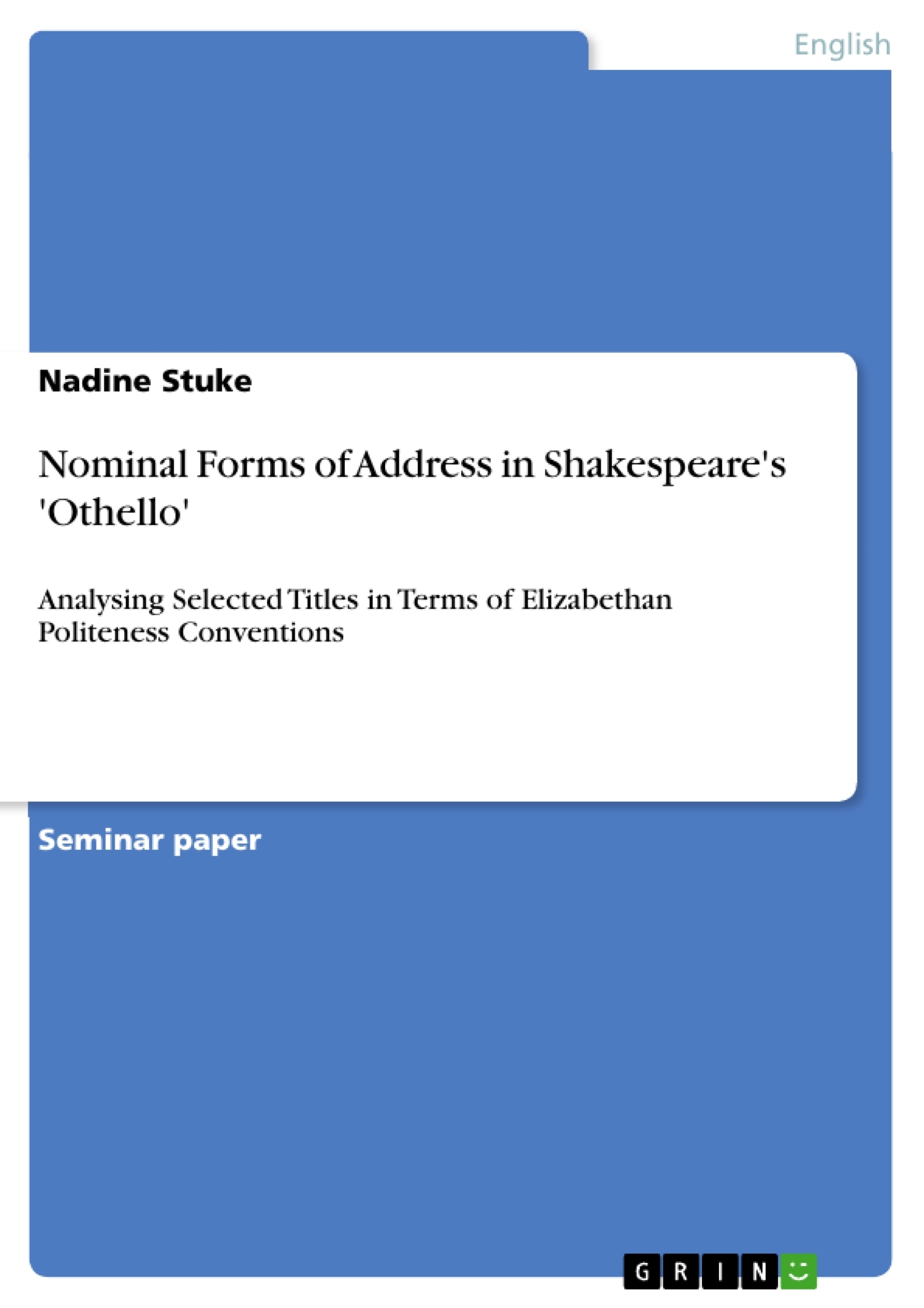Today, the concept of politeness is not associated with class consciousness or social discrimination anymore, but in the sixteenth century this term was commonly linked to deference and showing respect (Watts 34). Thus appropriate language behaviour was of utmost importance to Elizabethan society. People of that time were always anxious to please their interlocutors, especially with reference to forms of address.
Those address formulae had to be chosen accurately as they were very meaningful: Not only did they give information concerning personal relationships (Bruti 44) and emotions towards each other, but also about social ranks and hence power relations between speaker (S) and hearer (H). In Early Modern English times forms of address reflected the social hierarchy (Nevalainen & Raumolin-Brunberg 547; Replogle 102). So every title was assigned to a certain social status. To avoid using titles in an inappropriate or even impolite way, a lot of courtesy and conduct manuals were published (Watts 36).
In the following attention will be drawn on Shakespeare’s tragedy Othello (OTH) and the author’s use of address terms, particularly relating to salutations used by husband and wife and that between friends. Is Shakespeare’s choice of nominal address forms in accordance with Elizabethan conventions? By concentrating on the marital relationship between the characters Othello and Desdemona as well as on that between the two “friends” Othello and Iago, this term paper aims at answering this question. But before comparing Elizabethan conventions to Shakespeare’s dramatis personae, it is necessary to illuminate Brown and Levinson’s politeness concept that provides a basis for dealing with terms of address.
Inhaltsverzeichnis (Table of Contents)
- Introduction
- Brown and Levinson's Concept of Politeness
- Forms of Address in Early Modern English
- Husband and Wife
- Close Friends
- Vocative Forms of Address in Shakespeare's Othello
- Husband and Wife: Othello and Desdemona
- Friends: Othello and Iago
- Conclusion
- Works Cited
Zielsetzung und Themenschwerpunkte (Objectives and Key Themes)
This paper examines the use of nominal forms of address in Shakespeare's tragedy Othello, focusing on the relationships between Othello and Desdemona (husband and wife) and Othello and Iago (friends). The paper aims to determine if Shakespeare's choice of address forms aligns with Elizabethan politeness conventions. To achieve this, the paper explores Brown and Levinson's politeness theory and its application to forms of address in Early Modern English.
- Politeness conventions in Elizabethan society
- The relationship between forms of address and social hierarchy
- Brown and Levinson's politeness theory and its application to Shakespeare's Othello
- The use of address forms in marital and friendship relationships
- The significance of forms of address in conveying power dynamics and social relationships
Zusammenfassung der Kapitel (Chapter Summaries)
- Introduction: This chapter introduces the concept of politeness in Elizabethan society and its connection to social deference and respect. It emphasizes the importance of appropriate language behavior, particularly in forms of address, as a means of conveying social rank and power relations.
- Brown and Levinson's Concept of Politeness: This chapter explores Brown and Levinson's politeness theory, focusing on the "face-saving theory" and the concepts of positive and negative face. It discusses how these concepts relate to the choice of address forms and the potential for face-threatening acts.
- Forms of Address in Early Modern English: This chapter provides an overview of forms of address in Early Modern English, highlighting their significance in social interactions. It examines the use of vocative forms of address within families and emphasizes the importance of using appropriate titles to maintain social order and etiquette.
Schlüsselwörter (Keywords)
This paper focuses on the use of nominal forms of address in Shakespeare's Othello, exploring the relationship between politeness and social hierarchy in Early Modern English. Key topics include Elizabethan politeness conventions, Brown and Levinson's politeness theory, forms of address in marital and friendship relationships, and the role of address terms in conveying power dynamics.
Frequently Asked Questions
What are "nominal forms of address" in Shakespeare's works?
They are titles or names used to address someone (e.g., "Lord," "Husband," "Friend") which reflect social status, emotional closeness, and power dynamics.
How did Elizabethan society view politeness?
Politeness was closely linked to social hierarchy and deference. Choosing the correct form of address was vital to show respect and maintain social order.
What is Brown and Levinson's politeness theory?
It is a linguistic framework focusing on "face" (positive and negative) and how speakers use strategies to avoid "face-threatening acts" during interactions.
How do Othello and Desdemona address each other?
The paper analyzes their marital address forms to see if they follow the standard Elizabethan conventions for husband and wife or show unique emotional traits.
What does the address between Othello and Iago reveal?
The use of terms like "friend" or specific titles highlights the perceived social equality or the manipulation and power struggle between the two characters.
Why did Elizabethan society use conduct manuals?
Manuals were published to help people navigate complex social rules and avoid impolite behavior by using inappropriate titles for different ranks.
- Citation du texte
- Nadine Stuke (Auteur), 2011, Nominal Forms of Address in Shakespeare's 'Othello', Munich, GRIN Verlag, https://www.grin.com/document/200303



